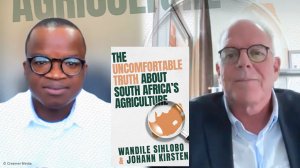The agricultural sector now enjoys universal recognition and its status as a growth propeller is embraced in a way that transcends sectoral interests. Specifically, the country’s political leadership deeply appreciates the importance of agriculture in driving the rural economy, addressing poverty and creating job opportunities.
Much has also been written about the sector’s untapped opportunities for unlocking growth and addressing racial inequities in its ownership. Our attempt in this book is to move the conversation even further and provide a more concrete view of how to unlock the agricultural potential in South Africa fully.
We specifically attempt to highlight some uncomfortable truths about South Africa’s agriculture by focusing on some key principles and highlighting policies and economic realities. This is done in the hope that everyone will now have the same level of understanding of the specific needs and interventions in the sector.
While the contents may be uncomfortable for some, this book is intended to ignite an urgent call for decisive policy and programme implementation and to demand stronger collaboration among social partners.
ABOUT THE AUTHORS
Wandile Sihlobo is the Chief Economist of the Agricultural Business Chamber of South Africa (Agbiz) and the author of two books: A Country of Two Agricultures – The Disparities, the Challenges, the Solutions (Tracey McDonald Publishers, 2023) and Finding Common Ground: Land, Equity & Agriculture (Picador Africa, 2020). He is a Senior Lecturer Extraordinary at the Department of Agricultural Economics at Stellenbosch University and a Visiting Research Fellow at the Wits School of Governance. Wandile holds a Bachelor of Science degree in Agricultural Economics from the University of Fort Hare and a Master of Science degree in Agricultural Economics from Stellenbosch University. Wandile was appointed as a member of President Cyril Ramaphosa’s Presidential Economic Advisory Council in 2019 (and re-appointed in 2022), having served on the Presidential Expert Advisory Panel on Land Reform and Agriculture from 2018.
After completing his BSc Agric Hons in Agricultural Economics at Stellenbosch University Prof Johann Kirsten started his career as an agricultural economist in the South African government where he quickly learned about agricultural economics in practice. In that period he completed his MSc Agric at the University of Pretoria and published several papers from the thesis. In 1992 he joined University of Pretoria as a lecturer, and this started his academic career of more than 30 years while also completing his PhD in 1994. For twenty of these years, Johann was Professor and Head of the Department of Agricultural Economics at the University of Pretoria (1996 -2016). During the years at UP he was President of the Agricultural Economics Association of South Africa (2001-2003), and during 2006-2009 also vice president of the International Association of Agricultural Economists. Johann’s research focus was always on matters related to agricultural policy. At first it was on agricultural development policy, then on land reform policy and for the last 20 years on policy and economic matters related to ‘origin-based foods’. In this regard his research activities contributed to the establishment of regulations in South Africa in 2019 and then finally the registration of Karoo Lamb as South Africa’s first Geographical Indication on 27 October 2023. This is a life achievement and involved the interplay between intellectual property rights, law, economics, meat science, pasture science, geography, chemistry, etc. With his move to Stellenbosch University in 2016 Johann’s academic focus changed to macroeconomics as the Director of the Bureau for Economic Research.
'The Uncomfortable Truth about South Africa's Agriculture' is published by Tracey McDonald Publishers
EMAIL THIS ARTICLE SAVE THIS ARTICLE ARTICLE ENQUIRY
To subscribe email subscriptions@creamermedia.co.za or click here
To advertise email advertising@creamermedia.co.za or click here










